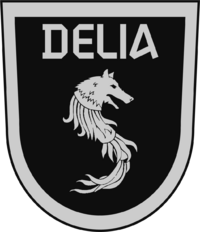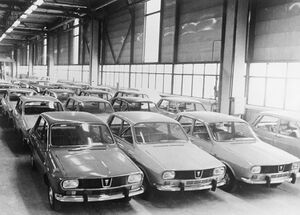Delia Automotive: Difference between revisions
No edit summary |
mNo edit summary |
||
| (8 intermediate revisions by 2 users not shown) | |||
| Line 15: | Line 15: | ||
| subsid = Delia Watercraft | | subsid = Delia Watercraft | ||
| footnotes = | | footnotes = | ||
| foundation = {{start date and age|df=yes| | | foundation = {{start date and age|df=yes|1956|10|10}} | ||
| location = XX, S.R. Ardovia, [[Ostrozava]] | | location = XX, S.R. Ardovia, [[Ostrozava]] | ||
}}'''Delia Automotive''', often shortened to ''' | }}'''Delia Automotive''', often shortened to '''AutoDel''', is an [[Ostrozava|Ostrozavan]] automotive company based in Ardovia, with regional headquarters in other parts of the globe. The Delia manufacturing plant outside of Deva, Valdavia is Belisaria's sixth largest car manufacturing facility by volume producing 721,024 units (cars and CKD kits) in 2017. The company is most notable for its {{wp|Dacia 1300|1300}} and {{wp|Dacia 1310|1310}} series, which has been manufactured since 1965 in various body styles and is considered Ostrozava's ubiquitous automobile of the 20th century, and one of the most-sold cars in history. Since 1995, Delia has expanded beyond 1300 series production and entered the modern automobile market, notably developing several new models, expanding into international markets, and funding research into {{wp|hydrogen car|hydrogen}} and {{wp|electric car|electric engines}}. | ||
[[Category:Companies]] | ==History== | ||
[[Category:Ostrozava]] | The Ostrozavan automotive industry had largely been based out of Rheigen, Valdavia, and Litovia before the [[Great Republican War]]. With the destruction of several key facilities in bombing runs by [[Aureumterra|Auremterran]] air forces during late 1956, it was decided that several steel processing plants in Ardovia would be consolidated under one administration and set to build tanks in more defensible areas. The plant, located in a rocky outcrop outside of Vandarek in the Șomvor Quadrilateral, would first be designated '''Delia-15''' upon its opening in late 1956, and served as a {{wp|secret city}} and factory complex producing Bv.49 and Bv.53 tanks during the remainder of the war. The plant's opening coincided with a renewed Ostro-[[Ludvosiya|Ludvosiyan]] air assault, which restored an atmosphere of security among manufacturing in Transkarminia. Following the Correction and Third Worker's Convention, Delia was given an increased autonomy by the [[List of heads of state of Ostrozava|Manninger]] and [[List of heads of state of Ostrozava|Beranek]] administrations, and with peacetime rebuilding efforts underway and manufacturing methods becoming easier, a large domestic automobile market began to emerge. | ||
===Early Automobiles=== | |||
While the first automobile of the region had been completed in the [[Ostrozava#Utrătenia|Transkarminian Empire]] in 1899 by Hanuș Háček, sales had remained low due to {{wp|economic depression}} and lack of infrastructure; thus, even during the [[Ostrozava#Second Compact|Dalibor era]], most automobiles were largely imported from abroad, though heavy duty vehicles had been produced at the [[Șomvor Ironworks]] since after the [[Containment War]]; these were mostly {{wp|tram|trams}}, {{wp|rolling stock}}, and {{wp|military vehicles}}. Delia's introduction had spurred domestic manufacturing of automobiles, turning Ostrozava from a net importer of automobiles in 1963 to a net exporter in 1973. The first automobile produced by Delia, which began preseries production in 1962 and full-scale production in late 1963, was the {{wp|car|Delia 900}}, a {{wp|license production|license-produced}} copy of ________'s ________. | |||
===1300/1310/1400 Series=== | |||
[[File:DeliaManufacturingEarly.jpg|thumb|right|The 1300-series assembly plant in 1969. At its most busy, the Vandarek plant could produce 700 vehicles in a single day.]] | |||
=====International 1300 variants===== | |||
{{Main|wikipedia:Renault 12|l1=Vatluna 12}} | |||
===1980s Stagnation=== | |||
===International endeavors intensify=== | |||
===Modern era and new technology=== | |||
==Innovation== | |||
==Cultural impact== | |||
[[Category:Ajax]][[Category:Companies]][[Category:Ostrozava]] | |||
Latest revision as of 20:16, 18 July 2024
This article is incomplete because it is pending further input from participants, or it is a work-in-progress by one author. Please comment on this article's talk page to share your input, comments and questions. Note: To contribute to this article, you may need to seek help from the author(s) of this page. |
 | |
| Public | |
| Industry | Automotive |
| Founded | 10 October 1956 |
| Headquarters | XX, S.R. Ardovia, Ostrozava |
Key people | XX |
| Products | Automobiles, commercial vehicles, military vehicles |
| Revenue | X billion (2015) |
| X million (2015) | |
Number of employees | 22,550 |
| Subsidiaries | Delia Watercraft |
Delia Automotive, often shortened to AutoDel, is an Ostrozavan automotive company based in Ardovia, with regional headquarters in other parts of the globe. The Delia manufacturing plant outside of Deva, Valdavia is Belisaria's sixth largest car manufacturing facility by volume producing 721,024 units (cars and CKD kits) in 2017. The company is most notable for its 1300 and 1310 series, which has been manufactured since 1965 in various body styles and is considered Ostrozava's ubiquitous automobile of the 20th century, and one of the most-sold cars in history. Since 1995, Delia has expanded beyond 1300 series production and entered the modern automobile market, notably developing several new models, expanding into international markets, and funding research into hydrogen and electric engines.
History
The Ostrozavan automotive industry had largely been based out of Rheigen, Valdavia, and Litovia before the Great Republican War. With the destruction of several key facilities in bombing runs by Auremterran air forces during late 1956, it was decided that several steel processing plants in Ardovia would be consolidated under one administration and set to build tanks in more defensible areas. The plant, located in a rocky outcrop outside of Vandarek in the Șomvor Quadrilateral, would first be designated Delia-15 upon its opening in late 1956, and served as a secret city and factory complex producing Bv.49 and Bv.53 tanks during the remainder of the war. The plant's opening coincided with a renewed Ostro-Ludvosiyan air assault, which restored an atmosphere of security among manufacturing in Transkarminia. Following the Correction and Third Worker's Convention, Delia was given an increased autonomy by the Manninger and Beranek administrations, and with peacetime rebuilding efforts underway and manufacturing methods becoming easier, a large domestic automobile market began to emerge.
Early Automobiles
While the first automobile of the region had been completed in the Transkarminian Empire in 1899 by Hanuș Háček, sales had remained low due to economic depression and lack of infrastructure; thus, even during the Dalibor era, most automobiles were largely imported from abroad, though heavy duty vehicles had been produced at the Șomvor Ironworks since after the Containment War; these were mostly trams, rolling stock, and military vehicles. Delia's introduction had spurred domestic manufacturing of automobiles, turning Ostrozava from a net importer of automobiles in 1963 to a net exporter in 1973. The first automobile produced by Delia, which began preseries production in 1962 and full-scale production in late 1963, was the Delia 900, a license-produced copy of ________'s ________.
